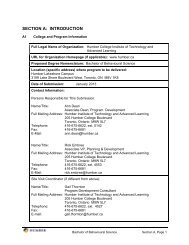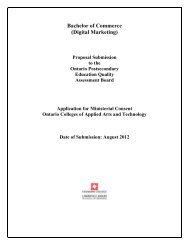ONTARIO - Postsecondary Education Quality Assessment Board
ONTARIO - Postsecondary Education Quality Assessment Board
ONTARIO - Postsecondary Education Quality Assessment Board
You also want an ePaper? Increase the reach of your titles
YUMPU automatically turns print PDFs into web optimized ePapers that Google loves.
<strong>ONTARIO</strong>:a global leader in quality assuranceA MESSAGE FROM THE CHAIR AND FROM THE DIRECTORContinuedlocal advisory committees, with special thanks to: David Leyton-Brown,Executive Director, Ontario Council on Graduate Studies, Council of OntarioUniversities; Cindy Hazell, Co-chair, Coordinating Committee of Vice Presidents,Academic, Association of Colleges of Applied Arts and Technology of Ontario;Earl Davy, Provost, Tyndale University College; and to Minster Chris Bentleyand Deputy Minister Philip Steenkamp, both of whom addressed the delegateson behalf of the Ministry and the Province. Of course, none of this could haveoccurred without the encouragement and support of Janet Mason, AssistantDeputy Minister, and all of our colleagues in the Ministry of Training, Collegesand Universities and the Secretariat’s full involvement.Continuous ImprovementThe work of the <strong>Board</strong> and Secretariat is considered very positively as thesection of this report on the annual survey of applicants and assessors’ opinionfeedback indicates.Based on the feedback on page 5, the <strong>Board</strong> has improved the PEQABwebsite, updated its Frequently Asked Questions, and is currently developinga single handbook that can be used by public and private institutions andOntario Colleges to replace the current three handbooks.Internal Review of the Post-secondary <strong>Education</strong> Choice and ExcellenceAct, 2000In December, the Minster notified the <strong>Board</strong> that he was undertaking an internalreview of the Post-secondary <strong>Education</strong> Choice and Excellence Act, 2000.Citing the release of Reaching Higher: The McGuinty Plan for Post-SecondaryMcGuinty Plan for Post-Secondary <strong>Education</strong> and the passing into legislationof the new Private Career Colleges Act, the Minster decided that: “It is nowboth timely and appropriate to ensure that the PSECE Act fits properly andcompletely with the new, enhanced postsecondary framework for Ontario.”As of this writing, the results of this internal review have not been released.Credential Recognition within and outside of CanadaDuring the past year members of the <strong>Board</strong> and the Secretariat were oftenasked to speak on both the theoretical and the operational aspects of qualityassessment. To Ontario groups, the major emphasis was on the rigor of the<strong>Board</strong>’s standards and of its assessment processes, usually in response4to the issue of the potential lack of recognition for the purpose of furthereducation that might be given to the degrees offered by this new set of publicand private providers. To national groups, the focus was on the importanceof the Pan-Canadian standards and quality assurance procedures that wouldmove us further toward recognition of the academic legitimacy of allCanadian degree providers.When speaking to international groups, the emphasis by inviter’s requestwas always on describing the QA requirements in Ontario/Canada - in particular,the extent to which quality assessment is either done directly or overseen byan independent third-party using standards and processes that are in generalagreement with those that have become standard in the international community.This latter concern cannot be underestimated. In the long run, basedon numerous conversations with government officials and government andnon-government QA agencies, it will almost assuredly be the case thatdegrees awarded by public or private institutions that are not subject tointernationally accepted QA standards and processes will be worthless interms of employment or advanced education in the vast majority of countries.In fact, this is already the case in some jurisdictions. In this regard, we arealways happy to point out that the work done by the <strong>Board</strong> concerningdegrees offered by ministerial consent and by the Council of OntarioUniversities concerning provincially assisted universities that have degreegranting authority under their own legislation has put the degree grantinginstitutions of this province in a very strong position.In closing, we must note that this is the first time that the <strong>Board</strong>’s annualreport does not contain a section authored by Dr. Donald Baker. Don left hisposition as the Director of the secretariat in 2006 to take on the duties ofDean of the College of Humanities and Social Sciences at the United ArabEmirates University Al Ain. This is not new territory for Don, who was theVice-President Academic of Wilfrid Laurier University and the President ofMount Royal College in Alberta, and who, as an educational consultant, alsooversaw a number of educational and quality assurance projects in severalcountries in the Middle East. Don’s contributions to the work of the <strong>Board</strong>and to quality assessment in general have been truly outstanding, and hispresence will be sorely missed both professionally and personally. Our sincerethanks are also extended to Sascha Marschang, who resigned his positionas Administrative Coordinator in January, and is now working for the Belgo-Luxembourgish-German Chamber of Commerce in Brussels.{ }Dale Patterson, ChairTerry Miosi, Acting DirectorTo national groups, the focus was on the importance of the Pan-Canadian standards and qualityassurance procedures that would move us further toward recognition of the academic legitimacy of allCanadian degree providers.
















